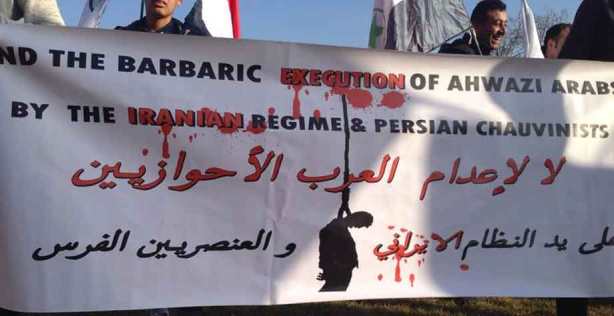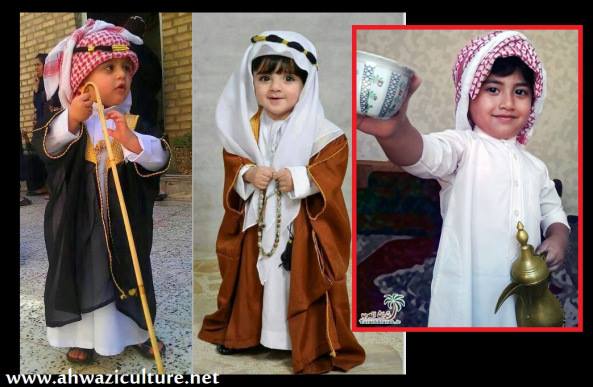The objective of this article is to highlight the pervasive systematic violations of the Ahwazi Arab people’s rights. Over the last 36 years, essentially coinciding with the formation of the Islamic Republic of Iran, these violations have increased many-fold, even as the Ahwazis continue demanding their legitimate rights.
This article seeks to provide a comprehensive picture of the prolonged oppression of the Ahwazi Arab people. They are suffering from ultra-national racism, institutionalized discrimination and deliberate neglect at the hands of Iran’s regime. They are facing various barriers in accessing education, employment, housing, healthcare and other essential services.
Since 1925, the Ahwazi Arab people have been subjected to summary executions, forcible displacement, migration, and the confiscation and destruction of homes and personal property. Under Iran’s current fundamentalist sectarian regime, the Ahwazi people live in constant fear of oppression. The current Iranian clerical regime is systematically completing the ethnic cleansing agenda that was begun by the deposed Pahlavi regime.
Around 10 million Ahwazi Arabs inhabit the south and southwest of Iran. They are one of the Middle East’s oppressed peoples.
They are united through race, culture and language. Their Arab dialect resembles the Iraqi Arabic dialect. The Majorities are Shia and Sunni Muslim, although there are a number of other religions and creeds, such as Christians and Mandaeans.
The Iranian regime has shown a deep-seated hatred against the Ahwazi Arab people, who constitute 10% of the population. In 1925, the emirate of Al- Ahwaz, ruled by Amir Khazaal Al-Kaabi, was toppled by an invasion by the Iranian regime. The invasion put an end to the independent sovereignty of Al-Ahwaz, which was annexed to the newly formed country of Iran in 1934.
Since then, through countless rebellions, armed insurrections and unarmed movements, the Ahwazi Arabs have reiterated their determination to continue their struggle and their resistance against the occupation of Ahwaz and to reassert the sovereignty of Ahwaz that was lost to the Iranian invasion.
For generations, the Ahwazis have received harsh treatment at the hands of the Iranian authorities. In response to the popular uprisings that followed the Iranian occupation, successive Iranian regimes have forcibly resettled much of the Ahwazi Arab population in Persian regions, as part of a program of ethnic cleansing. Historical Arabic names of cities have been changed into Persian ones. Arabic dress has been completely banned. The use of the Arabic language in Ahwaz has been greatly restricted and even criminalized. Even the ethnic identity of the Ahwazi Arab has been denied.
Ahwazi Arabs have long been suppressed and denied basic rights. In recent years, Ahwazi lands have been confiscated forcibly with threats and intimidation and redistributed to Persian settlers in an attempt to “Persianize” Ahwazi regions. In the late 1940s, the government began systematically settling the nomadic “Lur tribes”, who are offshoots of Persian ethnics, into areas with Arab majorities, particularly in the oil-rich cities from which the Arab people were forcibly relocated.
These ethnic cleansing policies have been accelerated in recent years in an effort to destroy the demographic fabric of Ahwaz. Any popular movement or protest led by the Ahwazi political class, such as the popular uprising of April 2005 against institutionalized ethnic oppression, has been brutally crushed by cracking down on the protestors and making mass arrests, even executing the majority of the prominent political figures.
In fact, the Ahwazi Arab people have sought and tried all peaceful political channels to obtain their most basic and legitimate rights, which are enshrined and stated in Iran’s current constitution. In particular, the Ahwazi Arabs have sought the application of Articles 15 and 19 of the Constitution, which stress the right of education in the mother tongue for all ethnic groups, including Arabs, Turks, Kurds and Baluchs. The regime, however, refuses to implement these articles, thus depriving more than 50% of the non-Persian population of their mother tongue. Instead, the regime has imposed the Persian language as the official language of the education curriculum. This policy has resulted in a high rate of students dropping out from schools at early ages in the marginalized non-Persian regions: due to the challenges of learning the Persian language, students are held back linguistically, becoming only partially proficient in both their native tongue and the imposed Persian language. This also results in students suffering from a dual identity crisis.
The Iranian occupation regime is utilizing a variety of strategies in its efforts to obliterate Arab identity in Al-Ahwaz. One of these strategies is to introduce Persian-speaking settlers and give them homes among communities of Arab citizens with the aim of having a negative impact on the Ahwazi Arab citizens in Al-Ahwaz. In addition, a massive number of schools, institutions, and centers are being built for the express goal of imposing and spreading the Persian language and culture, while obscuring and excluding the Arabic language and everything that is associated with the identity, culture and history of the Ahwazi Arab people.
Of course, the Ahwazi Arab people’s protests against the Iranian occupation are not limited to such issues. Since the military occupation of Al-Ahwaz until now, Iran has been practicing all types of repressive measures, and through the prosecution of multiple pernicious policies, the regime is attempting to eliminate totally the Arabic identity of the Ahwazis.
The terrible legacy of Iran’s repressive nationalist occupation cannot be overstated. It has inflicted horrendous suffering on around 10 million Ahwazi Arab people, who have long suffered systematic marginalization by consecutive regimes of Iranian occupation, going back to the Shah, before the current theocratic regime, in terms of land, territories, resources, language, culture, customary laws, and political and economic opportunities.
From the outset, the occupation of Al-Ahwaz by a racist colonial-settler state has been aimed at eradicating all that is Arabic in Al-Ahwaz. No effort has been spared to liquidate the culture, the language, the history and the whole Ahwazi Arab national entity within the crucible of the Persian culture through the denial of all legitimate rights, such as education and the teaching of the Arabic language, which is one of the most important pillars of raising new enlightened generations. A second language (Farsi) is being imposed.
Since the emergence of the Islamic Republic’s regime, everything related to Arab culture has been declared to be ‘against God’ and thus banned. As a matter of fact, the clerical regime does not concern itself with religious beliefs as much as they are concerned about fighting the Ahwazi Arab identity and snuffing out their culture. This colonialist policy has led the Ahwazi Arab people to fall far behind in terms of development and education, with the policy being practiced in parallel with terrorism, intimidation and oppression, all of which have weakened and made the Arabic language fragile among the Ahwazis.
The Iranian occupation apparatuses have been attempting to falsify and distort the national identity and culture of Ahwazis by describing them as Iranian Arab and as an Arab-speaking minority, which is intended to suggest that they are not originally Arab, but that they are Persians who over time have come under the linguistic influence of their neighbors and become Arab-speakers because of the proximity of Arab countries. The threat of the national Ahwazi Arab ideal to a Persian national security policy has occupied a key position not only among the Iranian security forces; it has become central to the Iranian nationalist political ideology, which is based on the dual doctrines of Persian nationalism and Iranian Islam (Shia Islam).
From the books and studies published by the Iranian strategic centers at the service of the occupation, we can understand how critical this issue is to the regime. Such studies and publications are full of strategies and vile concepts aimed at countering the Ahwazi Arab struggle; they are filled with weird concepts created to tarnish the image of the national Ahwazi movement. For example, these books and publications label Ahwazis as loyalists of the Arab Socialist Ba’ath Party. After the fall of the Iraqi regime, the Iranian occupation produced the concept of Wahhabism. Then it invented the lies that the Ahwazi political activists are Western spies and stooges, enemies of God, traitors, or infidel atheists. These charges carry the death penalty, and the biased judicial systems of the Iranian occupation use them to murder Ahwazi Arab political prisoners.
 Owing to this, the threat of imprisonment and execution has been a constant reality for every Ahwazi. This threat is aimed at weakening the willpower of the Ahwazi Arab nation so that it will surrender its prolonged struggle for liberation, its struggle to regain the independence stolen by Iran in 1925. Despite all these repressive strategies, not only has the Ahwazi Arab culture not lost its fortitude, on the contrary, it has become even stronger.
Owing to this, the threat of imprisonment and execution has been a constant reality for every Ahwazi. This threat is aimed at weakening the willpower of the Ahwazi Arab nation so that it will surrender its prolonged struggle for liberation, its struggle to regain the independence stolen by Iran in 1925. Despite all these repressive strategies, not only has the Ahwazi Arab culture not lost its fortitude, on the contrary, it has become even stronger.
Racial denial and elimination, mass extrajudicial murder, ethnocide and forced displacement have constituted the main policies of the Islamic Republic of Iran in dealing with the Ahwazi people and other national groups. However, the indigenous culture and the ethical and historical values of the Ahwazi Arab nation, as manifested in the context of social resistance, have never surrendered to the assimilationist policies of the Iranian effort to build a nation state on the basis of a mono-ethnic Persian identity.

Reblogged this on Gab.
[…] Arabs, for instance—my own ethnic group—for Persians to express racist sentiments such as “You are not real Arabs! You are Arabized due to proximity with Arab countries, but you are really on….” Or “If you wish to express your Arabism or defend what you dub an ‘Arab identity’, get […]